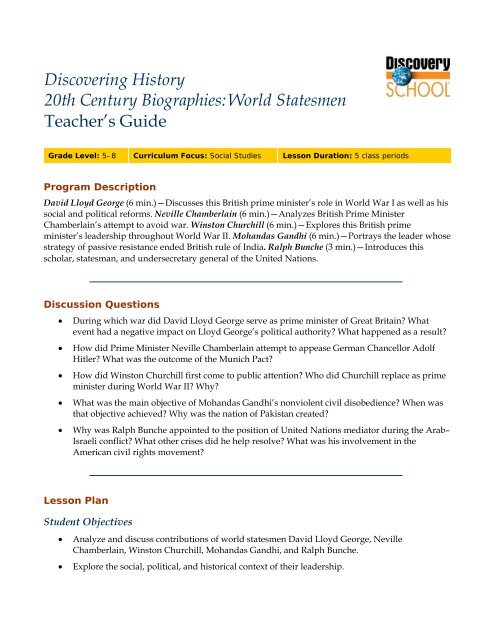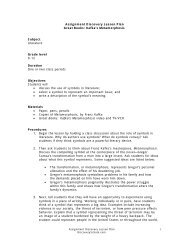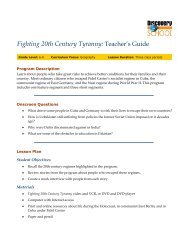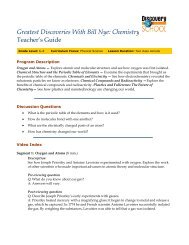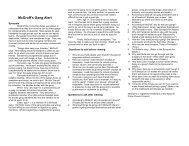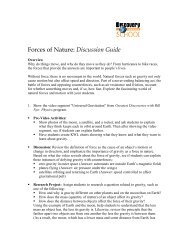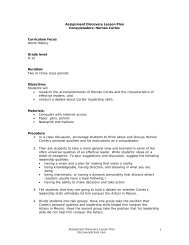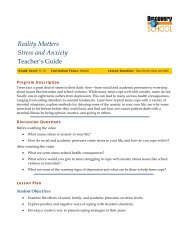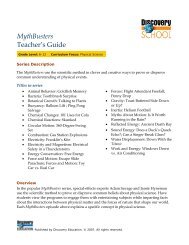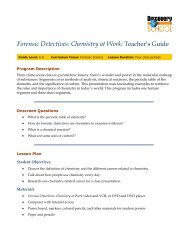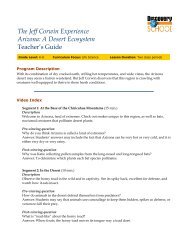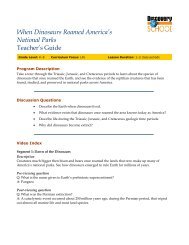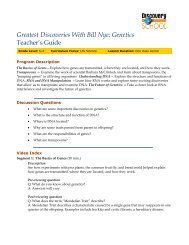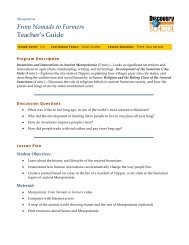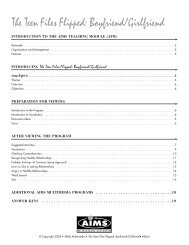Discovering History 20th Century Biographies:World Statesmen ...
Discovering History 20th Century Biographies:World Statesmen ...
Discovering History 20th Century Biographies:World Statesmen ...
Create successful ePaper yourself
Turn your PDF publications into a flip-book with our unique Google optimized e-Paper software.
<strong>Discovering</strong> <strong>History</strong><br />
<strong>20th</strong> <strong>Century</strong> <strong>Biographies</strong>: <strong>World</strong> <strong>Statesmen</strong><br />
Teacher’s Guide<br />
Grade Level: 5–8 Curriculum Focus: Social Studies Lesson Duration: 5 class periods<br />
Program Description<br />
David Lloyd George (6 min.)—Discusses this British prime minister’s role in <strong>World</strong> War I as well as his<br />
social and political reforms. Neville Chamberlain (6 min.)—Analyzes British Prime Minister<br />
Chamberlain’s attempt to avoid war. Winston Churchill (6 min.)—Explores this British prime<br />
minister’s leadership throughout <strong>World</strong> War II. Mohandas Gandhi (6 min.)—Portrays the leader whose<br />
strategy of passive resistance ended British rule of India. Ralph Bunche (3 min.)—Introduces this<br />
scholar, statesman, and undersecretary general of the United Nations.<br />
Discussion Questions<br />
• During which war did David Lloyd George serve as prime minister of Great Britain? What<br />
event had a negative impact on Lloyd George’s political authority? What happened as a result?<br />
• How did Prime Minister Neville Chamberlain attempt to appease German Chancellor Adolf<br />
Hitler? What was the outcome of the Munich Pact?<br />
• How did Winston Churchill first come to public attention? Who did Churchill replace as prime<br />
minister during <strong>World</strong> War II? Why?<br />
• What was the main objective of Mohandas Gandhi’s nonviolent civil disobedience? When was<br />
that objective achieved? Why was the nation of Pakistan created?<br />
• Why was Ralph Bunche appointed to the position of United Nations mediator during the Arab–<br />
Israeli conflict? What other crises did he help resolve? What was his involvement in the<br />
American civil rights movement?<br />
Lesson Plan<br />
Student Objectives<br />
• Analyze and discuss contributions of world statesmen David Lloyd George, Neville<br />
Chamberlain, Winston Churchill, Mohandas Gandhi, and Ralph Bunche.<br />
• Explore the social, political, and historical context of their leadership.
<strong>20th</strong> <strong>Century</strong> <strong>Biographies</strong>: <strong>World</strong> <strong>Statesmen</strong><br />
Teacher’s Guide<br />
• Examine the role of each in national and international affairs.<br />
• Analyze the impact of their leadership on national affairs and international relationships.<br />
• Use maps to gain a clearer understanding of the location of places and events.<br />
• Research and discuss the Munich Pact.<br />
• Examine each statesman’s approach to achieving or maintaining peace.<br />
• Analyze and discuss the traits and characteristics common to effective leadership.<br />
• Explore the philosophy of civil disobedience and passive resistance.<br />
• Research and discuss the history of the Nobel Prize.<br />
• Research and write a report on the life and legacy of one of the five statesmen.<br />
Materials<br />
• <strong>20th</strong> <strong>Century</strong> <strong>Biographies</strong>: <strong>World</strong> <strong>Statesmen</strong> video<br />
• Computer with Internet access<br />
• Large world map<br />
• Print resources about David Lloyd George, Neville Chamberlain, Winston Churchill, Mohandas<br />
Gandhi, and Ralph Bunche<br />
Procedures<br />
1. Prior to viewing the program, ask students to define the word “statesman.” Discuss the<br />
leadership qualities a person might need to be an effective statesman. On the board print the<br />
names of the statesmen presented in this program: David Lloyd George, Neville Chamberlain,<br />
Winston Churchill, Mohandas Gandhi, and Ralph Bunche. Explain to students that they will be<br />
viewing a program about these leaders. Ask students to share what they know about these<br />
statesmen. Encourage them to keep the following questions in mind as they watch the program:<br />
What were the significant contributions of each statesman? What specific traits or characteristics<br />
did each demonstrate that helped make him an effective leader? (Teachers may also wish to<br />
refer to the vocabulary section of this guide and discuss any terms that are unfamiliar to<br />
students.)<br />
2. After viewing the program, review the information presented: Who were the statesmen<br />
presented in the program? What leadership position did each hold? When did each serve? What<br />
did each accomplish? How did each individual’s country benefit from his statesmanship? What<br />
impact did each individual’s leadership have on other nations? As leaders, how were these men<br />
similar? How were they different?<br />
3. Discussion: There are numerous—sometimes contradictory—views concerning the traits and<br />
characteristics leaders should have. Compare, for example, the traits and characteristics of<br />
Mohandas Gandhi with those of Winston Churchill. Discuss the following with students: How<br />
Published by Discovery Education. © 2006. All rights reserved.<br />
2
<strong>20th</strong> <strong>Century</strong> <strong>Biographies</strong>: <strong>World</strong> <strong>Statesmen</strong><br />
Teacher’s Guide<br />
does a leader become a leader? What qualifies a person to be a leader? Why do people elect<br />
specific individuals as leaders?<br />
4. Map work: Have students locate the following places on a large map of the world: England,<br />
London, Wales, Ireland, Germany, Munich, Czechoslovakia, Poland, Casablanca (Morocco),<br />
Yalta (Ukraine), India, South Africa, Pakistan, Israel, Jerusalem, and the Suez Canal. Discuss<br />
with them the significance of each location in relation to people and events presented in the<br />
program.<br />
5. Munich Pact: <strong>World</strong> War II began approximately one year after the signing of this infamous<br />
pact. Have students use print and Web resources to research the topic in preparation for a<br />
general discussion: What was the Munich Pact? Who signed it? When? Why did Adolf Hitler<br />
feel Germany had a right to the Sudetenland? Why has the agreement become synonymous<br />
with treachery? Why did Prime Minister Chamberlain agree to it? Do the students think Hitler<br />
had any intention of honoring the pact? If not, why did Hitler sign the agreement? In their<br />
opinion, what could Chamberlain have done differently to keep the peace? The Web sites below<br />
are sources of relevant information:<br />
• Munich Pact<br />
http://encarta.msn.com/encyclopedia_761562425/Munich_Pact.html<br />
• The Munich Pact<br />
www.britannia.com/history/docs/munichpact.html<br />
6. Winston Churchill was a leader whose words inspired a nation. He not only spoke of courage<br />
but was himself an individual of exceptional personal and political daring, a leader who<br />
welcomed and won two votes of confidence when <strong>World</strong> War II was at its worst. Enduring the<br />
fall of France, the evacuation of Dunkirk, an ill-equipped army, and an air force dramatically<br />
outnumbered by the Luftwaffe, he stood firm and challenged the British people, “Let us<br />
therefore brace ourselves to our duties and so bear ourselves that, if the British Empire and<br />
Commonwealth last for a thousand years, men will still say, ‘This was their finest hour.’” Have<br />
students explore the “Speeches and Quotes” pages of The Churchill Center Web site (see below)<br />
with the following questions in mind: Do the life, words, philosophy, or accomplishments of<br />
Winston Churchill have relevance today? What can we learn from his words and his<br />
leadership? Ask students to select a statement that they particularly like or admire to share with<br />
the rest of the class.<br />
• Winston Churchill: Speeches and Quotes<br />
www.winstonchurchill.org/i4a/pages/index.cfm?pageid=387<br />
7. Gandhi: The quotes below provide some insight into Mohandas Gandhi’s philosophy. Select<br />
one or more to use as the basis of a general class discussion: What does the statement mean?<br />
How might the statement apply to everyday living or to contemporary social and political<br />
conditions? Do you agree or disagree with the statement? Explain your position.<br />
• “We must be the change we wish to see.”<br />
• “Nonviolence is the greatest force at the disposal of mankind. It is mightier than the<br />
mightiest weapon of destruction devised by the ingenuity of man.”<br />
Published by Discovery Education. © 2006. All rights reserved.<br />
3
<strong>20th</strong> <strong>Century</strong> <strong>Biographies</strong>: <strong>World</strong> <strong>Statesmen</strong><br />
Teacher’s Guide<br />
• “The weak can never forgive. Forgiveness is the attribute of the strong.”<br />
• “They cannot take away our self-respect if we do not give it to them.”<br />
• “It may be long before the law of love will be recognized in international affairs. The<br />
machineries of government stand between and hide the hearts of one people from those of<br />
another.”<br />
8. Nobel Prize: Alfred Nobel was a famous inventor and endowed the prizes that bear his name.<br />
Each year on December 10—the anniversary of Nobel’s death—an award ceremony is held in<br />
Oslo, Norway, and a new selection of Nobel laureates receives a medal, a diploma, and a<br />
monetary prize. Have students use print and Web resources to learn more about the man<br />
behind this highly regarded award: Who was Alfred Nobel? Where was he born? Why did he<br />
grow up in Russia? While studying in Paris, what substance did Alfred Nobel become<br />
interested in? How did he think it could be used? How did he formulate dynamite? Why was<br />
Nobel once described as “Europe’s richest vagabond”? What do the Nobel Prizes reward?<br />
When was the first prize awarded? There are six Nobel Prize categories. What are they? Why is<br />
a peace prize included as one of the categories? How do awards like the Nobel Prize encourage<br />
excellence? In the students’ opinion, are awards such as the Nobel Prize important? Which of<br />
the statesmen portrayed in the video received the Nobel Peace Prize? For what achievement?<br />
The following Web sites provide useful information:<br />
• Alfred Nobel’s Life and Work<br />
http://nobelprize.org/nobel/alfred-nobel/biographical/life-work/gradeschool.html<br />
• Nobel Prize <strong>History</strong><br />
www.infoplease.com/spot/99nobel1.html<br />
9. Written report: Ask students to select one of the five statesmen presented in the program for<br />
further research. Assign them to write a report summarizing their findings. The report should<br />
include a paragraph concerning the statesman’s accomplishments and legacy as well as a final<br />
opinion paragraph discussing the overall success or failure of his leadership. The required<br />
length of reports should be tailored to the students’ age and grade level.<br />
Assessment<br />
Use the following three-point rubric to evaluate students’ work during this lesson.<br />
• 3 points: Students effectively analyzed and discussed the Munich Pact, the Nobel Prize,<br />
traits of leadership, and each of the statesmen in all contexts requested, conducting all<br />
required research in preparation; demonstrated a clear grasp of places and events through<br />
the use of maps; produced a complete report about a statesman, including all of the<br />
requested information.<br />
• 2 points: Students analyzed and discussed the Munich Pact, the Nobel Prize, traits of<br />
leadership, and each of the statesmen in most contexts requested, conducting most required<br />
research in preparation; demonstrated an adequate grasp of places and events through the<br />
use of maps; produced a satisfactory report about a statesman, including a major portion of<br />
the requested information.<br />
Published by Discovery Education. © 2006. All rights reserved.<br />
4
<strong>20th</strong> <strong>Century</strong> <strong>Biographies</strong>: <strong>World</strong> <strong>Statesmen</strong><br />
Teacher’s Guide<br />
Vocabulary<br />
• 1 point: Students did not satisfactorily analyze or discuss the Munich Pact, the Nobel Prize,<br />
traits of leadership, or any of the statesmen in the contexts requested, conducting little of the<br />
required research in preparation; demonstrated a minimal grasp of places and events<br />
through the use of maps; produced an unacceptable report about a statesman, including a<br />
minimal amount of the requested information.<br />
appeasement<br />
Definition: The policy of granting concessions to potential enemies to maintain peace<br />
Context: Prime Minister Chamberlain’s attempt to establish peaceful relations with Hitler and<br />
Mussolini through appeasement ended in failure.<br />
Atlantic Charter<br />
Definition: A joint declaration by the United States and Great Britain that established a vision for<br />
a post-<strong>World</strong> War II world even though the United States had yet to enter the war<br />
Context: In 1941 Prime Minister Churchill met with President Roosevelt to draft the Atlantic<br />
Charter.<br />
Chancellor of the Exchequer<br />
Definition: The senior finance minister in the British government and a member of the prime<br />
minister’s cabinet<br />
Context: Chancellor of the Exchequer David Lloyd George was responsible for collection and<br />
management of the national revenue.<br />
civil disobedience<br />
Definition: Refusal to obey a law or follow a policy believed to be unjust<br />
Context: Those who practice civil disobedience base their actions on moral right and usually<br />
employ the nonviolent technique of passive resistance.<br />
civil rights<br />
Definition: Rights that a nation’s inhabitants enjoy by law; civil rights have a legal as well as a<br />
philosophical basis<br />
Context: While working as a legal advisor in South Africa, Gandhi fought for the civil rights of<br />
Indian immigrants.<br />
diplomat<br />
Definition: An official engaged in international negotiations<br />
Context: In his role as a diplomat, Dr. Ralph Bunche maintained high standards of excellence<br />
and professional integrity.<br />
Published by Discovery Education. © 2006. All rights reserved.<br />
5
<strong>20th</strong> <strong>Century</strong> <strong>Biographies</strong>: <strong>World</strong> <strong>Statesmen</strong><br />
Teacher’s Guide<br />
League of Nations<br />
Definition: A world organization established in 1920 to promote international cooperation and<br />
peace<br />
Context: Prime Minister Lloyd George helped form the League of Nations.<br />
mediator<br />
Definition: Someone who acts as an intermediate agent in a transaction or helps to resolve<br />
differences<br />
Context: United Nations mediator Ralph Bunche helped negotiate a peaceful resolution to the<br />
1948 Arab–Israeli conflict.<br />
Munich Pact<br />
Definition: The 1938 agreement between Britain, France, Italy, and Germany under which<br />
Germany was allowed to extend its territory into parts of Czechoslovakia where Germanspeaking<br />
peoples lived (the Sudetenland)<br />
Context: The Munich Pact was drawn up in response to Hitler’s escalating demands for control<br />
of more territory.<br />
parliament<br />
Definition: The national legislature of various countries, particularly that of the United<br />
Kingdom, which is made up of the House of Lords and the House of Commons<br />
Context: Elected to Parliament in 1908, David Lloyd George became an active social reformer.<br />
passive resistance<br />
Definition: A method of nonviolent protest against laws or policies in order to force a change or<br />
secure concessions; also known as nonviolent resistance<br />
Context: Passive resistance is the main tactic of civil disobedience.<br />
prime minister<br />
Definition: The head of the cabinet (a body of persons appointed to head the executive<br />
departments of the government) and often also the chief executive of a parliamentary<br />
democracy<br />
Context: Prime Minister Winston Churchill was the courageous voice of Great Britain<br />
throughout <strong>World</strong> War II.<br />
Sudetenland<br />
Definition: A region of the northern Czech Republic along the Polish border, long a home to<br />
ethnic Germans, which the Nazis seized in September 1938<br />
Context: The Munich Pact permitted Germany’s takeover of the Sudetenland.<br />
untouchable<br />
Published by Discovery Education. © 2006. All rights reserved.<br />
6
<strong>20th</strong> <strong>Century</strong> <strong>Biographies</strong>: <strong>World</strong> <strong>Statesmen</strong><br />
Teacher’s Guide<br />
Definition: A person born outside the four Hindu castes (social status or position conferred by a<br />
system based on class) and considered below those within the castes<br />
Context: Mohandas Gandhi worked to achieve reforms that improved the social status of India’s<br />
untouchables.<br />
Academic Standards<br />
Mid-continent Research for Education and Learning (McREL)<br />
McREL’s Content Knowledge: A Compendium of Standards and Benchmarks for K–12 Education<br />
addresses 14 content areas. To view the standards and benchmarks, visit<br />
www.mcrel.org/compendium/browse.asp.<br />
This lesson plan addresses the following national standards:<br />
• <strong>History</strong>—Historical Understanding: Understands and knows how to analyze chronological<br />
relationships and patterns; Understands the historical perspective<br />
• United States <strong>History</strong>: Era 9—Postwar United States (1945 to early 1970s): Understands the<br />
economic boom and social transformation of post-<strong>World</strong> War II United States; Understands<br />
domestic policies in the post-<strong>World</strong> War II period; Understands the struggle for racial and<br />
gender equality and for the extension of civil liberties<br />
• <strong>World</strong> <strong>History</strong>: Era 8—A Half-<strong>Century</strong> of Crisis and Achievement, 1900–1945: Understands<br />
the causes and global consequences of <strong>World</strong> War I; Understands the search for peace and<br />
stability throughout the world in the 1920s and 1930s; Understands the causes and global<br />
consequences of <strong>World</strong> War II; Understands major global trends from 1900 to the end of<br />
<strong>World</strong> War II<br />
• <strong>World</strong> <strong>History</strong>: Era 9—The <strong>20th</strong> <strong>Century</strong> Since 1945: Understands how post-<strong>World</strong> War II<br />
reconstruction occurred, new international power relations took shape, and colonial empires<br />
broke up; Understands the search for community, stability, and peace in an interdependent<br />
world; Understands major global trends since <strong>World</strong> War II<br />
• <strong>World</strong> <strong>History</strong> Across the Eras: Understands long-term changes and recurring patterns in<br />
world history<br />
• Geography—The <strong>World</strong> in Spatial Terms: Knows the location of places, geographic features,<br />
and patterns of the environment<br />
• Geography—Places and Regions: Understands the physical and human characteristics of<br />
place<br />
National Council for the Social Studies (NCSS)<br />
NCSS has developed national guidelines for teaching social studies. To become a member of NCSS<br />
or to view the standards online, go to www.socialstudies.org.<br />
This lesson plan addresses the following thematic standards:<br />
Published by Discovery Education. © 2006. All rights reserved.<br />
7
<strong>20th</strong> <strong>Century</strong> <strong>Biographies</strong>: <strong>World</strong> <strong>Statesmen</strong><br />
Teacher’s Guide<br />
• Culture<br />
• Time, Continuity, and Change<br />
• People, Places, and Environments<br />
• Power, Authority, and Governance<br />
• Global Connections<br />
Support Materials<br />
Develop custom worksheets, educational puzzles, online quizzes, and more with the free teaching tools<br />
offered on the DiscoverySchool.com Web site. Create and print support materials, or save them to a<br />
Custom Classroom account for future use. To learn more, visit<br />
http://school.discovery.com/teachingtools/teachingtools.html.<br />
DVD Content<br />
This program is available in an interactive DVD format. The following information and activities<br />
are specific to the DVD version.<br />
How to Use the DVD<br />
The DVD starting screen has the following options:<br />
Play Video—This plays the video from start to finish. There are no programmed stops, except by<br />
using a remote control. With a computer, depending on the particular software player, a pause<br />
button is included with the other video controls.<br />
Video Index—Here the video is divided into sections indicated by video thumbnail icons; brief<br />
descriptions are noted for each one. Watching all parts in sequence is similar to watching the video<br />
from start to finish. To play a particular segment, press Enter on the remote for TV playback; on a<br />
computer, click once to highlight a thumbnail and read the accompanying text description, and click<br />
again to start the video.<br />
Standards Link—Selecting this option displays a single screen that lists the national academic<br />
standards the video addresses.<br />
Teacher Resources—This screen gives the technical support number and Web site address.<br />
Video Index<br />
Published by Discovery Education. © 2006. All rights reserved.<br />
8
<strong>20th</strong> <strong>Century</strong> <strong>Biographies</strong>: <strong>World</strong> <strong>Statesmen</strong><br />
Teacher’s Guide<br />
I. David Lloyd George (6 min.)<br />
David Lloyd George, British prime minister during <strong>World</strong> War I, played a key role in winning the<br />
war. Discover why he has been called “the supreme architect of victory.”<br />
Pre-viewing question<br />
Q: What position does the prime minister of a country fill?<br />
A: A prime minister is the head of the cabinet—a body of individuals appointed to head the<br />
executive departments of the government—and often is the chief executive of a parliamentary<br />
democracy as well.<br />
Post-viewing question<br />
Q: What post-<strong>World</strong> War I organization did Prime Minister Lloyd George help to form? What was<br />
the organization’s main objective?<br />
A: Prime Minister Lloyd George helped to form the League of Nations. The League’s main objective<br />
was to mediate and resolve international disagreements peacefully.<br />
II. Neville Chamberlain (6 min.)<br />
In 1938 British Prime Minister Neville Chamberlain attempted to “secure peace in our time” by<br />
agreeing to Hitler’s demands for military expansion. Discover the reasons Chamberlain’s strategy<br />
of appeasement met with failure.<br />
Pre-viewing question<br />
Q: In your opinion, could <strong>World</strong> War II have been prevented? If so, how? If not, why not?<br />
A: Responses will vary.<br />
Post-viewing question<br />
Q: What were the demands by German Chancellor Adolf Hitler that Prime Minister Chamberlain<br />
and French Premier Daladier granted in hopes of maintaining peace?<br />
A: Chancellor Hitler demanded control of more territory, specifically the Sudetenland, a region of<br />
the northern Czech Republic along the Polish border long inhabited by ethnic Germans. In<br />
response, Chamberlain and Daladier engineered the Munich Pact of 1938, allowing Germany’s<br />
takeover of the Sudetenland.<br />
III. Winston Churchill (6 min.)<br />
Soldier, politician, author, and orator, Winston Churchill is among the most prominent leaders of<br />
the <strong>20th</strong> century. Meet this statesman who as prime minister became the voice of Great Britain<br />
throughout <strong>World</strong> War II.<br />
Pre-viewing question<br />
Published by Discovery Education. © 2006. All rights reserved.<br />
9
<strong>20th</strong> <strong>Century</strong> <strong>Biographies</strong>: <strong>World</strong> <strong>Statesmen</strong><br />
Teacher’s Guide<br />
Q: In your opinion, during a time of war or other national crisis, what qualities do people look for<br />
in their leaders?<br />
A: Answers will vary.<br />
Post-viewing question<br />
Q: In your opinion, what leadership qualities did Prime Minister Winston Churchill exhibit that<br />
rallied and sustained the people of Great Britain during <strong>World</strong> War II?<br />
A: Answers should include Churchill’s own personal courage and determination, his eloquent and<br />
stirring speeches, and his skill in matters of military strategy.<br />
IV. Mohandas Gandhi (6 min.)<br />
Advocating nonviolent resistance to injustice, Mohandas Gandhi became India’s dominant political<br />
figure during the 1920s. Learn how his strategy of passive resistance brought an end to British rule<br />
of India.<br />
Pre-viewing question<br />
Q: What is passive resistance? Is it always an effective tool for change, or are there certain<br />
conditions under which this approach would not be effective?<br />
A: Passive resistance is a method of nonviolent protest against laws or policies in order to force a<br />
change or secure concessions. Answers to the follow-up question will vary.<br />
Post-viewing question<br />
Q: Why was Mohandas Gandhi’s use of passive resistance effective against the British in India?<br />
A: Answers may include that the British were decent people who believed in the ideals of<br />
individual liberty and democracy, though it took them a while to extend these ideals to non-British,<br />
nonwhite people. Gandhi’s nonviolent tactics could succeed because his British opponents had a<br />
basic respect for human rights as well as moral values and ideals that were not at odds with those<br />
of the pacifists. The British also were rational—capable of understanding the logic of Gandhi’s<br />
position—and did not equate nonviolence with weakness.<br />
V. Ralph Bunche (3 min.)<br />
Scholar, statesman, and undersecretary general of the United Nations, Dr. Ralph Bunche was a<br />
spokesperson for peace and equality. Learn about his international efforts as well as his work in<br />
civil rights in America.<br />
Pre-viewing question<br />
Q: What is a diplomat? What skills and characteristics do you think would be most important for a<br />
diplomat to possess?<br />
A: A diplomat is an official engaged in international negotiations. Answers to the follow-up<br />
question will vary.<br />
Published by Discovery Education. © 2006. All rights reserved.<br />
10
<strong>20th</strong> <strong>Century</strong> <strong>Biographies</strong>: <strong>World</strong> <strong>Statesmen</strong><br />
Teacher’s Guide<br />
Post-viewing question<br />
Q: According to the program, what three international crises were successfully managed with the<br />
diplomatic intervention of Dr. Ralph Bunche?<br />
A: Dr. Bunche successfully negotiated an end to the 1948 Arab–Israeli conflict and the 1956 Suez<br />
crisis; in 1960 he organized and headed peacekeeping operations in the former Belgian Congo (now<br />
the Democratic Republic of Congo).<br />
Credit<br />
Patricia A. Peirson, freelance writer; former elementary school and adult ESL educator<br />
Published by Discovery Education. © 2006. All rights reserved.<br />
11


